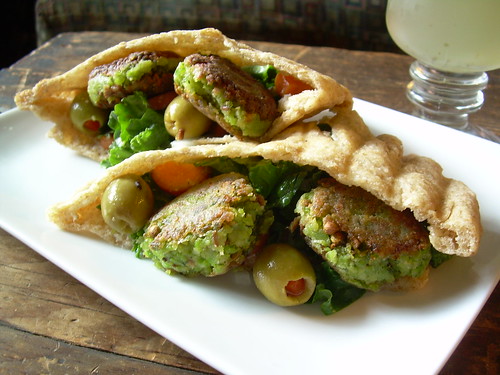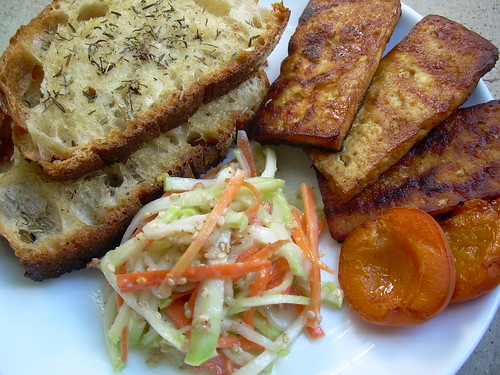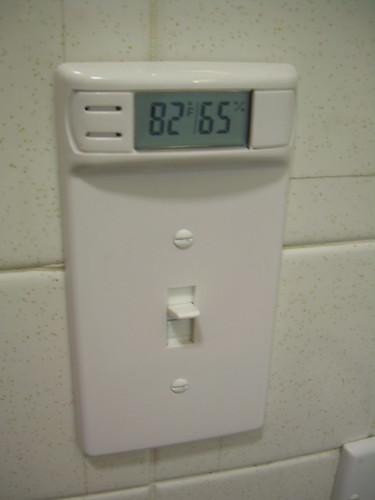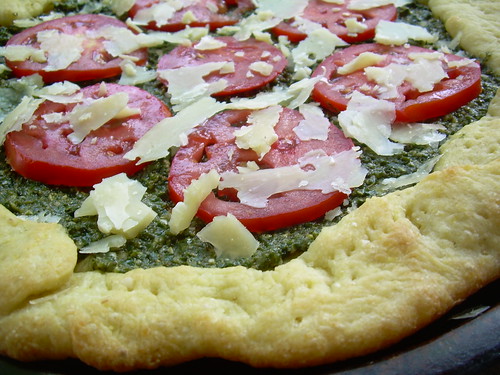 Yum! For dinner tonight, we made pesto pizza on a cornmeal crust, topped with our first tomatoes of the season and cheese from Windsor Dairy.
Yum! For dinner tonight, we made pesto pizza on a cornmeal crust, topped with our first tomatoes of the season and cheese from Windsor Dairy.Ingredients for large corn meal pizza crust:
2 1/2 c. all purpose flour
1 c. corn meal
1 T. sugar
1 t. dry active yeast
1/2 t. salt
2 T. olive oil
1 1/2 c. water
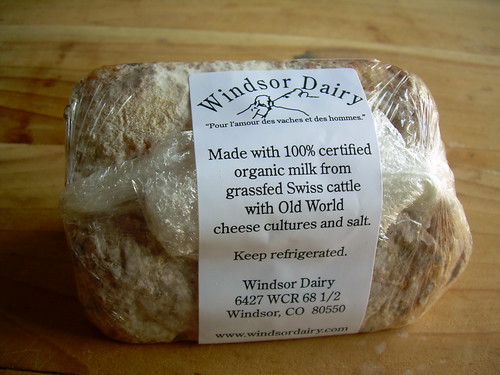 Onto the rambling! Windsor Dairy is great. They sell excellent artisan cheeses made from local, organic, grassfed cow's milk. The cheeses are just the gateway. The REALLY cool thing about Windsor Dairy is that they offer raw, unpasteurized grass-fed cow's milk to the masses. The way they do this is a little complicated but it is still effective. In Colorado, legislation allows you to consume raw milk from a cow that you own. Windsor Dairy offers a "cow share" program, where you buy a share of a cow and then pay a monthly boarding and milking fee on that cow and in return you can consume a weekly installment of raw milk.
Onto the rambling! Windsor Dairy is great. They sell excellent artisan cheeses made from local, organic, grassfed cow's milk. The cheeses are just the gateway. The REALLY cool thing about Windsor Dairy is that they offer raw, unpasteurized grass-fed cow's milk to the masses. The way they do this is a little complicated but it is still effective. In Colorado, legislation allows you to consume raw milk from a cow that you own. Windsor Dairy offers a "cow share" program, where you buy a share of a cow and then pay a monthly boarding and milking fee on that cow and in return you can consume a weekly installment of raw milk.This is significant to Eric and me because when we started getting into local food in Illinois, we were shocked to find no small-time dairy operations. I mean surely there must still be a few devoted small farmers, right? The thing is, there are laws. To sell milk, you need to own a lot of expensive equipment to process and pasteurize the milk to government standards. The standards are often prohibitively expensive for small processors: "Get big or get out." It's crazy though because you honestly don't need to pasteurize milk if its fresh, local, and from healthy, grass-fed cows. In fact it is way better for you than pasteurized milk trucked to you from CAFO cows. So why is it that the consumer doesn't have the right to choose?? In Illinois, we did end up finding a guy who would sell us raw, grass-fed cow's milk. It was totally under the table and we did it because we're that kind of people, but the point is that it shouldn't be so convoluted for the regular person to sell or buy quality food.
While I am on the subject, the government doesn't just inhibit small dairy, they also inhibit small, local food processors (people who make granola, jams, pastries, pickles, sauerkraut, etc). Small economies have unfair competition with grocery stores thanks to all of our subsidies to agribusiness. As if that weren't enough, you need a license and a commercial kitchen to sell food. You can't just sell your excess jars of jelly or custom cakes occasionally. To sell, you basically need to make a business commitment. I mean you can sell, but it's not so legal. Even if you try to do everything right, the city of Chicago may still swing by and destroy your granola. Unlike Illinois, Michigan recently took a really positive step in this arena by approving a cottage industry farm bill. People selling less than $15,000 a year in goods in Michigan no longer need a license nor do they need a commercial kitchen. They just have to label what is in their product and who/where it came from.
In conclusion, it is time for us all to change local food legislation in our states!


